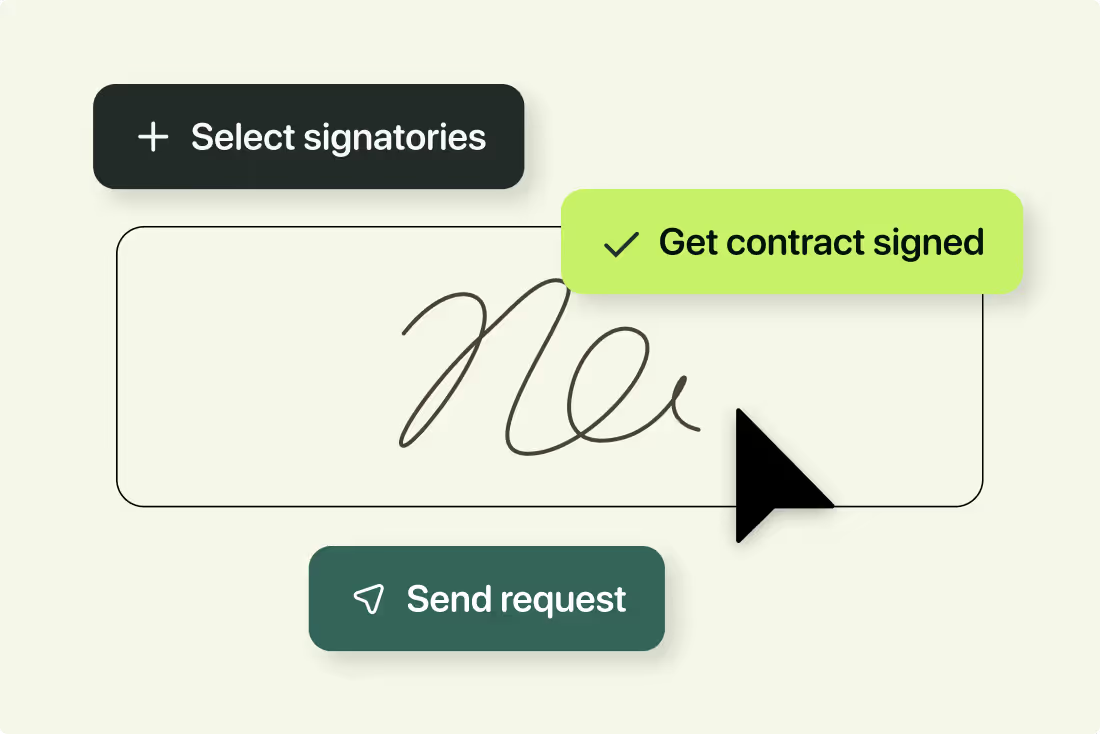Solutions
Customer Support
Resources
Most contracts today have exemption clauses in them. But there’s a lot of law around exemption clauses, and when they are and aren’t enforceable.
Don’t worry though – here’s everything you need to know about exemption clauses in contracts.
An exemption clause is a clause in a contract that limits or removes a party’s liability if something goes wrong.
Exemption clauses often restrict certain contractual obligations and ensure that parties are only responsible for things within their control. However, they can also be used to unfairly disadvantage a counterparty, too.
Given how wildly different exemption clauses can be, there are certain rules and regulations that govern how and when they can be enforced. But we’ll explore that in more detail later in this piece. First, let’s explore the different types of exemption clauses used in contracts, and some examples of these.

Exemption clauses can cover a variety of things. However, there are two main types of exemption clauses you should consider when drafting a contract and entering into contract negotiations. These are limitation clauses and exclusion clauses. Let’s run through them now.
Limitation clauses are a type of exemption clause that limits a party’s liability for something. For example, parties may use a limitation clause to limit the amount of money they’re responsible for paying in damages if certain events occur, like a breach of contract.
An exclusion clause is another type of exemption clause. You’re probably ahead of us here – these exclude a party from liability, which means they take away all responsibility, either partly or completely.
Now that we understand what exemption clauses look like in practice, it’s worth considering why they are used in the first place.
Firstly, many commercial contracts will include exemption clauses. This is because they typically have a high contract value and therefore bear greater contractual risk. Exemption clauses are an effective way to regulate and minimize this risk.

It’s also wise to include exemption clauses when businesses enter into contracts with consumers for the sale of goods. This is because sellers can’t guarantee how their products will be used, and they want to limit their liability in the event of misuse.
If a consumer uses a product in a way that’s against the purpose of the product and the instructions provided, the seller should be able to restrict their liability if it were to break or potentially cause harm.
Exemption clauses can be enforceable. However, there are some exceptions to this rule.
Courts tend to look more favorably on limitation clauses, while being suspicious of exclusion clauses as they take away all responsibility. In fact, exclusion clauses can be deemed problematic given that they often leave innocent parties without access to any legal remedies if they are wronged.
That doesn’t mean that this type of exemption clause is invalid, though. It just means there are some rules around their enforceability. Let’s explore these three rules next.
This can be done in the following ways:
Let’s have a look at each of those in more detail.
This one’s pretty obvious, so we won’t dwell on this point too much. If you’ve signed a contract with an exclusion clause, then it’s likely to be valid – unless it’s unreasonable, or based on misrepresentation (i.e. if the statements of fact, or “representations”, you relied on during contractual negotiations are shown to be false).
When it comes to this type of exemption clause, the party excluding liability must take “reasonable steps” to make sure the other knows the exclusion clause exists. And they have to do this before or at the time they make the contract.
The case of Olley v Marlborough Court is a good example of this. Let’s go back to school for a moment and recall the facts of the case. Marlborough Court was a hotel where Ms Olley stayed. After checking in, she went out, leaving her key at reception. While she was away several of her things were stolen from her room.
The hotel claimed that a notice in the room saying they weren’t responsible for any lost or stolen items (unless they were left at reception) was a valid exclusion clause, and meant they weren’t liable.
Olley took them to court to claim damages for negligence. She won the case as the court decided the notice wasn’t visible to her until after she and the hotel had formed their contract. That’s because this happened when she checked in at reception, and she couldn’t have seen the notice until she went into the bedroom.
Just to really hammer the point home that exclusion clauses must be obvious, in J Spurling Ltd v Bradshaw, the judge stated that unusual exclusion clauses need:
“… to be printed in red ink on the face of the document with a red hand pointing to it before the notice could be held to be sufficient.”
"The party excluding liability must take 'reasonable steps' to make sure the other knows the exclusion clause exists"
This means that if you’ve previously been a party to a contract that involved an exclusion clause, it might be reasonable to assume it applies every time.
That’s by no means guaranteed though. Let’s look at some case law quickly that proves this. In Hollier v Rambler Motors, Hollier had taken his vehicle to the Rambler Motors’ garage three or four times over five years for repairs. Each time he’d signed a legal document excluding the garage’s liability for any damage. This time they made the contract verbally over the phone, and the garage didn’t mention the exclusion clause.
When the garage then damaged the car during the repairs, they tried to use “previous dealings” to argue that the exclusion clause was still valid. But the court found there weren’t enough previous transactions between the customer and the garage to make this valid. This meant that the garage did have to pay for the damage to Mr Hollier’s car after all.
To recap: in order to have a chance of being enforceable, an exclusion clause will need to be incorporated into the contract in one of three ways: within a signed contract, by notice, or through enough previous dealings. If that all makes sense, let’s move onto the next rule.
"If you’ve previously been a party to a contract that involved an exclusion clause, it might be reasonable to assume it applies every time"
The legal term for interpreting an exemption clause is “construction”. Within this, there are a few rules to remember.
Firstly, the courts won’t enforce a greater exclusion than the one included within the original exemption clause. And if there’s any ambiguity at all in the way it was drafted or described, that will go against the party attempting to rely on the clause.
This is quite a vague rule, so let’s look at another case that illustrates it well. This is the case of Houghton v Trafalgar Insurance. In this case, an exclusion clause in an insurance policy excluded damage to a car when it was carrying “any load in excess of that for which it was constructed”.
The claimant had six people in the car when it was damaged, but it was only made to carry five. As a result, the insurer refused the claim. But could the insurer rely on this exemption clause?
Unfortunately for the insurer, they could not. The courts decided that the term “load” in the exemption clause was too ambiguous, saying it meant the total weight the car could carry, not the amount of people. As a result, it ordered the insurance company to pay out for the claim.
It’s also important to note that courts will look at the fairness of the exemption clause in question. Let’s return to the textbooks once more and see how this rule works in practice.
In Green v Cade, a seller sold potato seeds that were infected with a virus. The buyer sued them for loss of profits, but the seller claimed an exclusion clause in their contract stated that buyers couldn’t complain more than three days after delivery. The court decided the buyer couldn’t have known the virus was there within three days of the seeds being delivered, making this exclusion clause unfair and therefore unenforceable.
"If there’s any ambiguity at all in the way it was drafted or described, that will go against the party attempting to rely on the clause"
This leads us neatly onto the third and final rule.
It sounds obvious, but an exemption clause will not be enforceable if it is illegal. In other words, if statutes render an exemption clause illegal, it will automatically be unenforceable.
Let’s look at a few different laws that could apply when drafting exemption clauses together now. Here are some from the UK:
In short: exemption clauses can be an effective way to minimize contractual risk. However, they must meet certain criteria in order to be enforceable. And if they're not enforceable, they're pretty much worthless.
That means it's important to draft exemption clauses with care, and most of the time it's best to ask a lawyer or attorney to draft them for you.
But what if you work in a scaling company with a lean legal team? Relying on legal's help can create friction and delays within the contract workflow. Well, that's where Juro can help.
Juro is the all-in-one contract automation platform that enables all teams to streamline the creation, execution and management of routine contracts at scale.
Specificially, Juro empowers business teams to self-serve on contracts using pre-approved contract templates. Juro also enables legal teams to bake certain clauses into these templates when certain conditions are met. This is achieved using a feature called conditional logic, as seen below.

This functionality enables legal teams to retain control over contracts and their contents without needing to draft each one individually themselves. It also means that complex clauses, like exemption clauses, can be automatically inserted into a contract with a certain contract value, or in a certain template.
This automation reduces contract admin and enables legal teams to get back to higher-value work.
To find out more about how Juro helps businesses automate routine contract admin and keep control of contract risk at scale, fill in the form below.

Lorem ipsum dolor sit amet, consectetur adipiscing elit. Suspendisse varius enim in eros elementum tristique. Duis cursus, mi quis viverra ornare, eros dolor interdum nulla, ut commodo diam libero vitae erat. Aenean faucibus nibh et justo cursus id rutrum lorem imperdiet. Nunc ut sem vitae risus tristique posuere.

